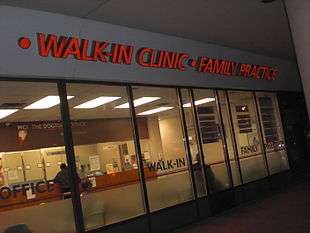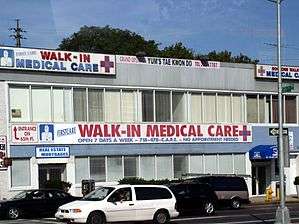Walk-in clinic
A Walk-In Clinic (also known as a Walk-In Centre) describes a very broad category of medical facilities loosely defined as those that accept patients on a walk-in basis and with no appointment required. A number of healthcare service providers fall under the walk-in clinic umbrella including urgent care centers, retail clinics and even many free clinics or community health clinics. Walk-in clinics offer the advantages of being accessible and often inexpensive.[1] It is estimated that there are nearly 11,000 walk-in clinics in America, although it is impossible to calculate an exact number given the variable and ill-defined nature of the category. Urgent care centers make up the largest percentage of walk-in clinics in America with an estimated 9,000 locations nationwide. In fact, consumers often erroneously refer to all walk-in clinics as urgent care centers, and vice versa. Retail clinics are the next most prevalent in the industry with 1,443 locations as of July 1, 2013.[2] However, amongst the negative aspects are that walk-in clinics provide poor quality healthcare as opposed to professional care such as regular doctors and hospitals.[3] Other disadvantages may include the urgency to make the patient's visit as quick as possible in order to reduce the long waiting list of walk-ins at the clinic, which may fail to fulfill the purpose of the visit.[4][5]

Services
Urgent care clinics are usually led by physicians. The much smaller category of retail clinics, which are stand-alone clinics located inside large retail stores or shopping malls, tend to be headed by nurse practitioners. The significantly higher price for an urgent care visit compared to a retail clinic visit is largely attributed to this difference in staffing.[6]
All types of walk-in clinics provide basic medical services, such as routine vaccinations, evaluation of cold and flu symptoms, and treatment for less severe physical injuries. Urgent care centers normally provide more services, such as X-ray testing for suspected pneumonia or broken bones.[6]
Access to the patient's regular medical records depends on the agreements that the clinic has with other organizations. For example, a walk-in clinic that is part of or affiliated with a hospital or larger clinic may have full access to all the medical records belonging to the larger institution, while an independent walk-in clinic may not have access any patient records except those related to previous visits to that walk-in clinic. This lack of access can prevent healthcare providers from recognizing chronic problems.[7]
Major companies

According to the brand tracker published by Urgent Care Locations from Solv (as of April 2018), the following are the top twenty walk-in clinic brands:[8]
| Company Brand | # of Clinics |
|---|---|
| CVS MinuteClinic | 837 |
| Healthcare Clinic at Walgreens | 413 |
| Concentra | 310 |
| MedExpress | 213 |
| American Family Care (AFC Urgent Care) | 187 |
| US Healthworks | 154 |
| NextCare Urgent Care | 143 |
| FastMed Urgent Care | 122 |
| CareNow Urgent Care | 96 |
| Advocate Health Care Clinics | 86 |
| The Little Clinic | 82 |
| GoHealth Urgent Care | 70 |
| MedPost Urgent Care | 68 |
| Target Clinic | 66 |
| CityMD Urgent Care | 66 |
| Doctors Care | 58 |
| Patient First Urgent Care | 55 |
| Aurora Health Care Clinics | 47 |
| CareSpot | 41 |
| CRH Healthcare | 40 |
Other walk-in clinics include WellStar Urgent Care.
Controversies
The existence of walk-in clinics has had some controversy. Doctors acknowledge that Minute Clinics and other retail-based clinics are convenient. Primary care doctors say they are trying to build a relationship with their patients, meet them regularly, and follow up on problems. These clinics interfere with that relationship and can potentially fragment health care. There is also the concern that the urgent care clinics fail to provide the primary care providers documents about the visit for the minor emergency. This can further fragment a patient's care. Claire McCarthy, pediatrician, addressed the lack of shared medical records, "Sometimes a minor thing isn't so minor." [7] The American Academy of Pediatrics has recommended that parents do not use retail-based clinics for primary care for their children.[9]
Walk-In Clinics Outside of the US
United Kingdom
Walk-in centres in the United Kingdom are similar to walk-in clinics in the United States, but are provided by the National Health Service, not on a commercial basis. They are not often located in retail facilities and are sometimes on hospital sites where they take patients who do not need the facilities of the Accident and Emergency Department. They are intended to divert patients from the A&E departments, which are under great pressure,[10] but there is a lack of public information about what services are provided and when. It has been pointed out that people need guidance to overcome an historic reliance on accident and emergency. Different words - walk-in centres, minor injury units and urgent care centres - may be used for similar facilities. In Blackpool the Walk-in centre and the Same Day Health Centre were both renamed Urgent Treatment Centres in August 2018. This was said to be a clear and comprehensive offer to patients. These urgent treatment centres were open for at least 12 hours a day, every day of the week, every week of the year, including bank holidays offering pre-bookable appointments.[11]
About 230 were opened in England in the 2000s. 51 closed between 2010 and 2014. 95 more were closed between 2014 and 2017 according to 38 Degrees. The Yeovil centre, opened in 2009, closed in 2017. The Somerset clinical commissioning group said too many people were misusing the town centre facility because it was convenient for them. It was replaced by an urgent care service at the hospital open from 10am to 6pm on Saturdays and Sundays.[12] Walk-ins in North Ormesby and Eston were closed in 2017 and replaced by the South Tees Access Response service, run by ELM Alliance Ltd, an alliance of local GPs, which offered late night and weekend appointments at four GP surgeries.[13]
Some centres are run by hospitals. Royal Devon and Exeter NHS Foundation Trust took over Exeter’s NHS walk-in centre from Northern Devon Healthcare NHS Trust in March 2018. It also runs Honiton Minor Injury Unit. The trust said they were more able to share skills and expertise and work as one team with the A&E department.[14]
The Care Quality Commission reported in June 2018 that about 10% of the urgent care services in England require improvement. They inspected 64 urgent care and walk-in centres.[15]
References
- "Urgent Care at a Walk-in Clinic". Doctors Express. Retrieved 16 June 2014.
- The ConvUrgentCare Report: U.S. Walk-in Clinic Market Report, Volume 6, No. 7. Merchant Medicine, LLC. July 1, 2013.
- "10 things walk-in clinics won't tell you". MarketWatch. Retrieved 2 November 2012.
- Wellstood, Katie, Kathi Wilson, and John Eyles. "“Unless you went in with your head under your arm”: patient perceptions of emergency room visits." Social science & medicine 61.11 (2005): 2363-2373.
- "Walk-in clinic: an experience to be dreaded". Toronto Sun. Retrieved 22 March 2009.
- "10 things walk-in clinics won't tell you". MarketWatch. Retrieved 2 November 2012.
- Why doctors worry about Minute Clinics--and what they should learn from them Claire McCarthy , Boston Globe, February 24, 2014
- "Leading Walk-in Clinic Companies". Urgent Care Locations fro Solv. 2018-04-26. Retrieved 2018-04-26.
- Laughlin JJ, Simon GR, Baker C, Barden GA, Brown OW, Hardin A, Lessin HR, Meade K, Moore S, Rodgers CT (March 1, 2014). "From the American Academy of Pediatrics. Policy Statement. AAP Principles Concerning Retail-Based Clinics". Pediatrics. 133 (3): e794–e797. doi:10.1542/peds.2013-4080. PMID 24567015.CS1 maint: multiple names: authors list (link)
- "Patients urged to avoid A&E this bank holiday". Eagle Radio. 25 August 2018. Retrieved 7 September 2018.
- "Fresh new name for Fylde health centres". Blackpool Gazette. 20 August 2018. Retrieved 7 September 2018.
- "NHS Mass closure of NHS walk-in centres is fuelling winter crisis, claim campaigners". Guardian. 7 January 2018. Retrieved 7 September 2018.
- "Out-of-hours GP service which replaced walk-in centres is dragged out of 'special measures'". Teesside Live. 24 May 2018. Retrieved 7 September 2018.
- "Exeter's walk-in centres will no longer be run North Devon Healthcare Trust". Devon Live. 22 March 2018. Retrieved 7 September 2018.
- "One in 10 primary care urgent care services in England not up to scratch". OnMedica. 22 June 2018. Retrieved 7 September 2018.